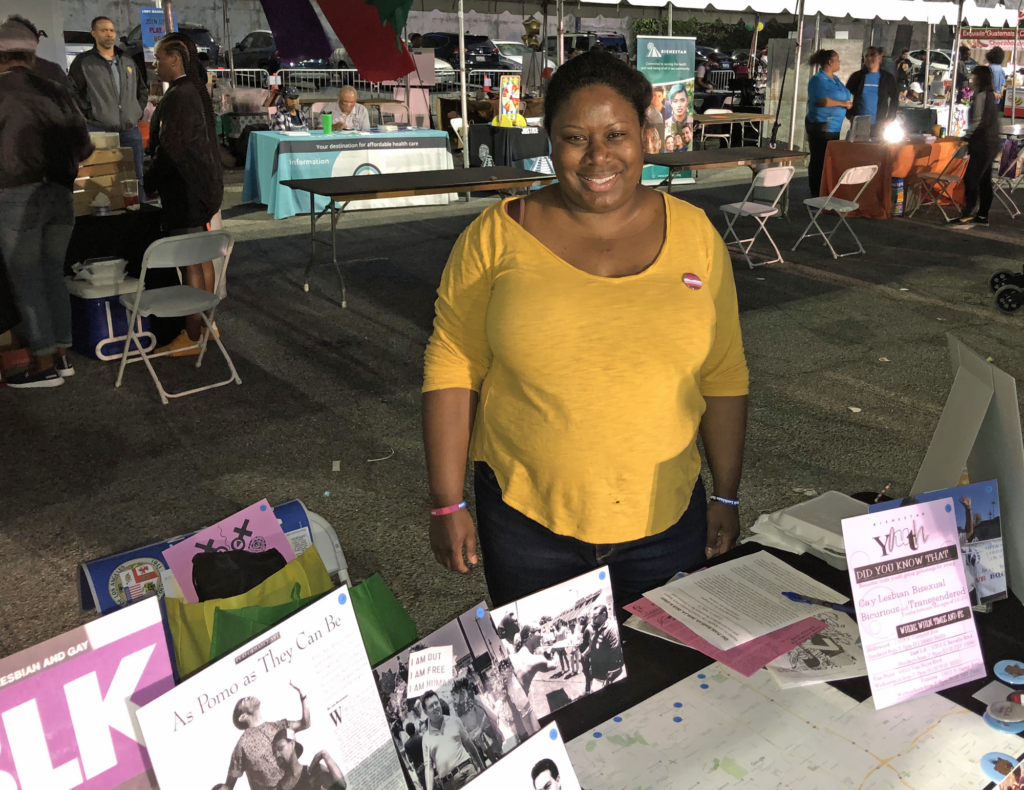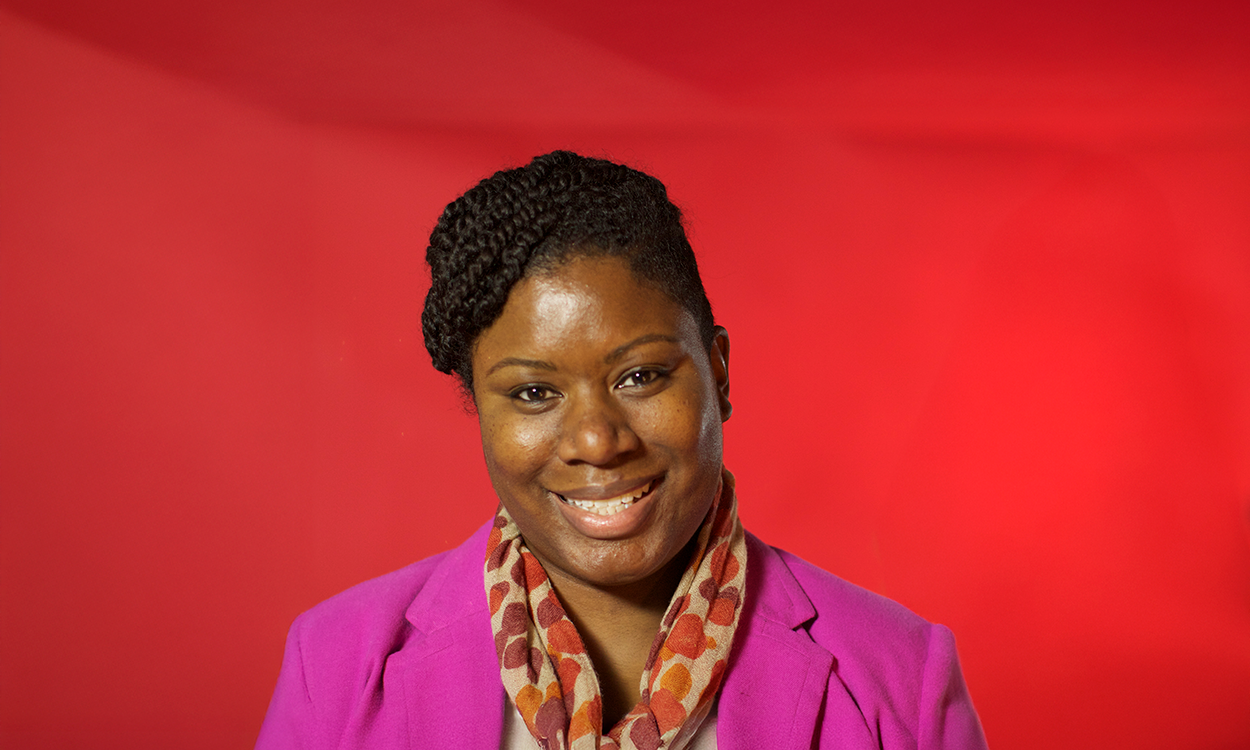UCLA alumna and librarian and archivist for UCLA Library Special Collections creates opportunities for community archives to share their cultural wealth.
Dalena Hunter (’07, MLIS) is excitedly opening a package that contains a copy of “A Handful of Earth, A Handful of Sky: The World of Octavia E. Butler.” She laughs as she holds up the slim volume, which was buried in a large box full of packing peanuts.
“The book is this big, but I have about two inches of this,” she says.
Hunter, who serves as a librarian and archivist for the Los Angeles Communities and Cultures program at UCLA Library Special Collections, is used to finding treasures similarly buried in the records of marginalized populations. Among her many projects have been helping to preserve the personal archive of Horace Tapscott, musician and founder of the Pan Afrikan Peoples Arkestra; a presentation she took part in at the 2018 San Diego Comic-Con titled, “Beyond Wakanda: Intersectional Afrofuturism” with Kelly Besser, archivist for UCLA Library Special Collections, and UCLA IS alumni Shani Miller (’16, MA, Moving Image Archive Studies) and Roderick Crooks (’11, MLIS; ’16, PhD); and her recent work with the UCLA Library Center for Oral Histories Research for the Black LGBT Project, which covers Black LGBT and Queer history in Los Angeles.
Hunter has been with UCLA Library Special Collections since 2019 and previously served as librarian for UCLA’s Ralph J. Bunche Center for African American Studies for 12 years. She achieved her bachelor’s degree in English literature at CSU Northridge. She shares her bookworm tendencies that led her to a career in libraries, the importance of her cohort in the UCLA Department of Information Studies, and the thrill of being able to find those hidden treasures of history in UCLA’s world-class trove, to help students, writers, and researchers complete their own projects.
What inspired the Los Angeles Community and Cultures program at UCLA Library?
Dalena Hunter: It came about because there was a need for Los Angeles history in general, to be better documented in archives, especially those stories that have traditionally been silenced or marginalized in archives. We’re all familiar with the ways that racial and ethnic minorities and women have been silenced and underrepresented in archives, but there are other groups of people who, because of the nature of the records that they’re producing … can be very difficult to capture in archives … LGBTQ+, women, communities of color, but also thinking about activist communities, religious communities, or businesses that may have been very important to a neighborhood – like bookstores or a landscape artist. There are so many things you might not think about, that really contributed to Los Angeles culture, or was an important part of the community, but may be kind of non-traditional.

What is a typical day on the job for you?
Hunter: A typical day on the job consists of championing a number of projects that are going forward [and] talking to potential donors or current donors, if something is going on with their collection. I just went to [an event] for Regina Jones, who donated the Soul Publications collection. There’s a documentary on her life called, “Who in the Hell is Regina Jones?” [that] was part of the Pan African Film Festival, and I went to that in support of her. I went to a celebration of life for Sir Lady Java, who was a Black trans performer in the 1960s and 1970s, who was a really big deal in that community, bringing a light and a voice to people of that identity and the Black LGBT community in general.
I’m a member of an organization called SOHA, which is the Southwest Oral History Association. I’m working on a diversity and anti-racist initiative in oral histories [and] organizations. I get to work with my colleagues on different things that they’re doing. Someone interviewed me for Our Weekly … because I helped a friend of mine with a Black history event called Unflinching, [which highlighted] a history of Black Queer in the 1980s and 1990s. I supported my friend and community member, bringing materials from [the UCLA] archives and setting up a display so that people could see this is what’s in the archives.
I get to make sure that those sorts of things are rolling forward, and I do time on the reference desk. I get to see our researchers and put a face to some of the people who are asking questions. It’s so cool to help somebody find that thing that really pulls their research together or to help someone find [somebody] in the archives. This student [said], “Oh, I wonder if my friend is in the archives,” and we were able to find it. She was just so excited. That kind of thing really made me want to stay and do this kind of work at UCLA, where people are very passionate about their research, and we have a lot of resources. There’s so much at UCLA, I don’t often have to send people elsewhere.
What is unique about your new project on the LGBTQ oral histories?
Hunter: One of the major things I’ve been working on is an oral history project about Black LGBTQ history in Los Angeles. I proposed it a little bit after I started, and then COVID happened right as we hired the first interviewer. But now, the project is wrapping up, and I’m planning an event around that project sometime next quarter. That’s been something that’s been lots of fun to work on. I’m just so glad we were able to do it, recognizing that there was this gap in our archives.
In talking to community members, some of those people still have [their] records, they’re still looking at them … reminiscing over them, and sometimes they have other plans for those materials. I was thinking, how can we have it represented in our archives at UCLA, and have it in a form that the community itself is able to access? The oral history project seemed to be the way to go.
It’s been really great. I knew a little bit about some communities because I’m a member of that community, but there are just so many community organizations and community leaders and activists, so I was really able to do more research and surface some of those things.
What are some of your best memories about your MLIS education at UCLA?
Hunter: I want to say, it was my fellow students. I was interested in a number of things and talking with them about their projects was just so interesting. I did a community project in one of my classes, and volunteered at the Bunche Center, and I was a reference desk assistant at the Charles E. Young Research Library (YRL) as well. I worked for a professor [who] wrote a book about a Black librarian. I found a unique piece of information for that book, like a wedding announcement or something [that] hadn’t been documented, I went through all of the little microfiche and found it. Things like that were so exciting that I just felt like, I want to keep doing this.
How would you encourage students to pursue their MLIS and a career in the archival field?
Hunter: I would say that it’s important to get as much hands-on experience as you can, to help you understand a lot of the philosophies and methodologies that you’re learning in your classes, because it can be challenging to link the two together. It’s important to be able to do it and to see, “Oh, this is what they’re talking about.”
I know epistemology [can be] boring and it can be hard. But once you start to get up to your elbows in somebody’s personal papers or collection development … then you really start to see how important it is to understand what the philosophy is behind what is a document, what is information, and how do people access information so that we can meet the needs of all of these different types of people. I would say to do that, get as many different types of experiences as you can, so that once you graduate, then you know, “This is my path.”
I just think it’s important, especially at this time in our nation’s history, to remember that we need to advocate for things like intellectual honesty and access to information and freedom of information … making sure that many different types of people are represented in the work we do, and in the documents we’re preserving and making accessible and promoting.
Without that, it’s very easy to be ignorant. Sometimes you’re ignorant just because you don’t know things, and that’s fine. But sometimes ignorance can lead to fear, and we don’t want that. I think it’s very important to remember that we can’t be neutral … we can’t be passive. We have to be passionate about our work, because it’s important at every level, from story time with the kids, to helping people with their dissertations or their movies or their books. It’s all super important to have that strong ethic of freedom of information.
Above photo: Courtesy of Dalena Hunter
